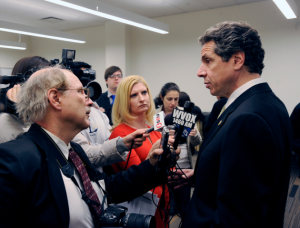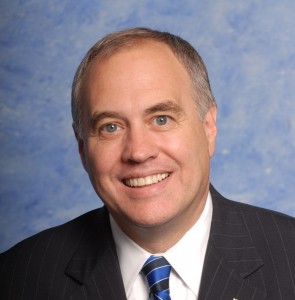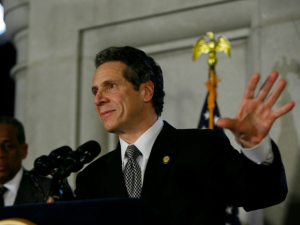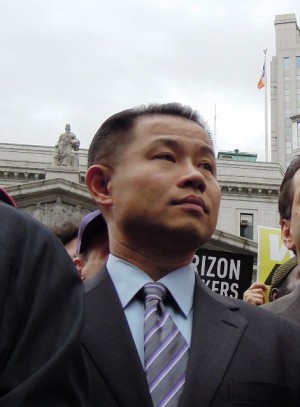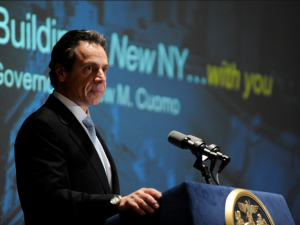Colby Hamilton appears in the following:
Former Comptroller Bill Thompson is the first 2013 mayoral contender with a website--updated
Thursday, February 23, 2012
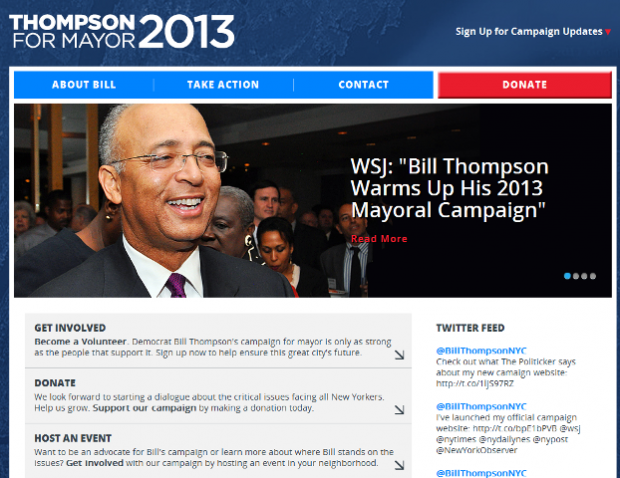 Bill Thompson has been trying to tell you: He's really, honestly, truly running for mayor in 2013!
Bill Thompson has been trying to tell you: He's really, honestly, truly running for mayor in 2013!
Add an official website to the list as proof: www.billthompsonformayor.com The former city comptroller and 2009 mayoral candidate unveiled his official 2013 website today. Unfortunately the site is giving a long error message when trying to be accessed so a picture of it isn't really possible--check out www.billthompsonformayor.com to see it when it's back up.
[ “According to the web master, so many people clicked in to view www.billthompsonformayor.com that the web site host could not handle the sheer volume. The site is live again," said Tom Butler, a Thompson spokesperson.]
“Over the next two years I hope to build a campaign of ideas and advance a long-overdue discussion on the challenges facing our great city,” Thompson said in a statement about the site.. “It's clear that we need compelling and innovative approaches to our most pressing concerns: jobs, education, public safety, affordability, transportation and more.”
So far Thompson is the only candidate besides Manhattan Media publisher Tom Allon to officially declare his intention. New York City Council Speaker Christine Quinn, the current city comptroller John Liu, Public Advocate Bill de Blasio and Manhattan Borough President Scott Stringer are all likely competitors for the seat as well.
CU's Dadey to Cuomo: Use the veto to get better maps in redistricting
Thursday, February 23, 2012
In a letter sent to Governor Andrew Cuomo, Citizen Union's Dick Dadey urges the Governor to use his veto threat to get better lines from the legislature and ensure fundamental reform for future redistricting.
"Citizens Union believes your veto threat provides you with valuable leverage because it poses the threat of uncertainty: the last thing the legislature can tolerate, particularly with regard to their own districts," Dadey writes. "We respectfully request that you use your veto threat ‐ unlike any other governor before you ‐ to achieve two important goals: secure lasting and permanent redistricting reform through statutory change and a constitutional amendment; and pursue meaningful changes to thisyear’s lines by holding direct negotiations with the legislature. We urge you to seek districts that reflect as best as possible the criteria outlined in your program bill on redistricting. Should this approach fail to produce needed changes to the 2012 maps and bring about lasting reform, we call on you to exercise your veto."
This call from Dadey to use the veto pen carefully essentially backs up what Cuomo told the Democrat and Chronicle late last week, when he laid out the conditions for which he would be willing to accept the lines passed by the majority parties in the state Senate and Assembly: "less hyper political" lines, and a commitment to passing both a constitutional amendment to establish an independent redistricting process as well as a law that would effectively do the same should the legislature fail to pass the constitutional amendment.
The Governor's office has pushed back strongly on the suggestion he was backing off his oft-mentioned pledge to veto lines that are drawn in a partisan way--something considered to be inevitable because the legislature is drawing them.
As YNN's Nick Reisman reports, Cuomo on Fred Dicker's show today again sounded like he was pushing back on any suggestion he's wavering in his veto threat. "If they send me these lines, these lines will be vetoed," the Governor said. But as Reisman notes, the Governor (again) is putting in qualifying language by talking about "these" lines, in other words, the current maps roundly denounced as a gerrymandered mess.
Senate Republicans and Assembly Democrats are going to come out with a new batch of maps soon. They are looking to vote on and pass a set of maps as soon as March 1--that's one week from today.
When they do, it is Cuomo and Cuomo alone who will decide whether the maps become law or likely move towards the courts. It's his veto that is the deciding factor, no matter how much he tries to understate that reality. If his remarks last week, and today's letter from Citizen Union, are any indication, it looks like the Governor is prepping us for a compromise that will see less egregious but still legislatively drawn lines become the reality.
DiNapoli gets three CA-based companies to disclose political donation system
Thursday, February 23, 2012
Not too long before Governor Andrew Cuomo went on Fred Dicker's radio program to declare "you are either with the special interests or your with the people" on pension reform, Comptroller Thomas DiNapoli put out a statement that highlighted one of the major benefits he sees in keeping the pension system largely like it is.
The Comptroller announced that the state's pension fund succeeded in getting three large California-based companies to agree to disclose how they're spending corporate political money. The release said the agreement with one of the companies, Pacific Gas & Electric, "includes a ground-breaking provision to provide further disclosures of the company’s policies and procedures regarding political lobbying activities."
“These agreements are a victory for shareholders and another step forward for transparency and accountability in the wake of the Citizen United decision,” DiNapoli said in a statement. “I am proud that the New York State Common Retirement Fund is in the vanguard of the movement to ensure that companies are acting with the best interests of shareholders in mind when they engage in political action. It is my hope that other companies will follow these companies’ leads by agreeing to fully disclose their political spending activities.”
DiNapoli has highlighted the usefulness of the fund from a political standpoint before. “By aggregating that capital, we can not only maximize the power to get superior return,” he said in an interview with the Empire last month. “You also can focus on the other ways in which you can make those companies you invest in be responsible corporate citizens in a way that makes their business model sustainable and profitable.”
The state pension fund has over $164 million invested in the companies mentioned in the statement today.
The Orthodox Jewish senate district in Brooklyn: a rebuttal
Thursday, February 23, 2012
The Orthodox Pundit blog has a great rebuttal to my posts on the new Orthodox Jewish majority district that's included in the proposed redistrictingmaps. My argument, made over a couple of posts, is that voting trends and registration suggest the new district isn't a sure thing for Senate Republicans and, more importantly, the dividing up of conservative voters into two senate districts in Brooklyn may end up backfiring.
In the response, the OP blogger points out the string of Republican-over-Democrat results--from McCain to Paladino--in Assemblyman Dov Hikind's district. Hikind, while a Democrat, has often sided with Republicans over social issues, and his district would be the heart of the proposed 17th Senate seat.
"They clearly lean republican," the OP blogger says. "Their registration as democrats and electing democrats is solely for political expediency. Democratic primaries are where most local races are decided, and they want to be a part of the process, and a republican city member is virtually worthless, so they will elect democrats.
"In national and statewide elections, they vote their conscience, and republicans generally do well. In local elections, where the candidates and their positions are less known, they will elect officials based on community leaders’ wishes, the candidates’ chances, and their support for the community, without any regards to party lines. This calculus until now favored democrats, because Orthodox haven’t had a chance to sway elections in places where republicans matter."
These points are well taken. OP's arguments are certainly the ones Senate Republicans had in mind when they went and drew the seat they did. The district's political leanings have far more to do with individual candidates and the issues inside the community than party registration.
The problem, though, is that senate districts are significantly bigger than assembly districts. The larger the seat, the more diverse the voting pool. In a place like Brooklyn, that means bringing in people that are actually Democratic voters.
That doesn't make anything OP is saying wrong. But the lens here is wider than just the Orthodox community, even as they will surely be the anchor to whatever district gets drawn. In trying to carve out two seats for Republicans in southern Brooklyn, Senate Republicans may be stretching themselves precariously thin.
But a lot of what happens at the end of this year will be determined by what happens in the election next month, as OP points out:
As of the current round, Lew Fidler is the clear front runner for Kruger’s seat. He’s a known in the community, and Storobin have yet to get a single community leader in the non-Russian Orthodox community behind him.
But Fidler haven’t nailed it down yet. The establishment is not firmly behind him. The two Borough Park Orthodox elected officials – even the councilman strongly behind his candidacy - have yet to endorse, and the leading Askunim are still wavering between the clear front runner and majority leader Skelos’ pick.
In essence, it’s clear that the seat is Lew Fidler’s to lose, but it is still a possibility. Should Storobin get the community leadership behind him.
Groups layout support for pension reform as Cuomo escapes the shill label
Wednesday, February 22, 2012
Pension reform is one of Governor Andrew Cuomo’s highest priorities this year. In both his state of the state speech, and more formally in his budget proposal, the Governor laid out his vision for fixing what many perceive to be the state’s broken and unsustainable pension system.
Cuomo would give future employees the option of participating in a defined contribution plan, which works like a 401(k) and would be similar to the system SUNY and CUNY use today. It's one of a couple reforms instituted under the Governor's new Tier VI proposal.
On the other side of things you have State Comptroller Thomas DiNapoli. The Comptroller has called basing policy on the current state of the pension system—still recovering from the financial sinkhole of the last few years—“not the smartest move.” In an op-ed today, he calle allowing a 401(k)-style option for state employees "a false choice" which would "undermine [new employees'] long-term retirement security."
“New York’s proposed move to a 401(k)-style plan just doesn’t make sense," DiNapoli said in the op-ed.
Over the past week think tanks, good government groups and research institutes have weighed in on the debate. In general, they’re supportive of the Governor’s proposals to change the state’s pension system—but in various ways, and in varying degrees.
New Orthodox Jewish state senate district, revisited
Wednesday, February 22, 2012
The post from yesterday about Senate Republican plans to create a new Orthodox Jewish district in southern Brooklyn received some attention that's worth going back to (not the typos; that I apologize for and have been fixed).
One commentor, mugwump, made this observation:
What this article neglects to mention is that most of the D senators in that area were unopposed in 2010, and this simulator doesn't correct for that since it uses raw vote totals. So what you're saying is that Democrats will win SD-17 if no Republican runs. In reality the number of R votes in the Orthodox seat (and in Golden's as well) is likely to be far higher.
That's a fair point. While working on the piece, I reached out to CUNY Center for Urban Research to see if they could help me figure out if there were more metrics we could look at.
What I got back late last night was a thorough breakdown of the voting registration totals for the proposed districts. Since we can't know the true voting breakdown in an actual election for a district that hasn't been created yet, this is probably the next best metric behind the simulation highlighted in the article yesterday.
According to the state Board of Elections' most current enrollment figures, the 27th Senate District has 83,731 active Democratic enrolled voters, and 25,482 Republicans, with 30,785 unaffiliated enrolled voters. That's 58.1 percent, 17.7 percent, and 21.3 percent of the total enrollment respectively.
According to the analysis by the CUNY folks, the proposed 17th Senate District would have an enrollment that looked like this:
Total: 127,148
Democrats: 79,003 / 62.1%
Republicans: 19,393 / 15.3%
The CUNY data doesn't provide information on unaffiliated voters.
Now, on a technical note, the numbers LATFOR used for determining voter totals in districts is an older set of enrollment numbers. There are actually more Republican voters and less Democrats in the 27th now--just under 500 less Dems and about 1000 more Republicans.
It's also worth noting that these sorts of numbers are present in the enrollment numbers for the 9th Congressional District, which saw a Republican elected in a special election last year.
That seems to be the playbook Senate Republicans are working with--the right sort of Republican can motivate even Democrats to come on board in the new 17th State Senate district. But if that were a recipe for certain success, you'd have to wonder why Democratic Assembly Speaker Sheldon Silver feels like keeping the 9th district around.
But I stand by my point: in trying to carve out two districts for Republicans in southern Brooklyn, Senate Republicans increase the chance they'll lose both. As the numbers above show, the new Orthodox Jewish district--all things being equal--would appear to favor a Democratic candidate.
I also mentioned Senator Marty Golden's numbers in yesterday's post. The percentage of Democrats enrolled in the district Golden would represent in the draft maps would increase from 50.4 percent Democrat currently to 51.4 percent in the proposed district.
Again, to be fair: Republicans increased by a nearly equal proportion. But upping the percentage of the opposing party's voters in your incumbents district might not be the best reelection strategy. But more it goes to show that, in a process designed to help those who draw the lines, there's only so much Senate Republicans can do (and you see the real need for a 63rd seat; 62 seats would make the districts even larger, likely bringing even more Ds into places like Golden's district).
The question will be, are they beginning to stretch these districts to the point of breaking?
32BJ endorses Councilman Lew Fidler for state senate
Wednesday, February 22, 2012
 The largest private-sector union in New York is throwing its support behind New York City Councilman Lew Fidler in his race to replace disgraced former Brooklyn state senator Carl Kruger in the 27th Senate District in southern Brooklyn.
The largest private-sector union in New York is throwing its support behind New York City Councilman Lew Fidler in his race to replace disgraced former Brooklyn state senator Carl Kruger in the 27th Senate District in southern Brooklyn.
“Councilman Fidler has a record of championing the rights of working people throughout the city,” said 32BJ's president Mike Fishman in a statement. “We are committed to supporting candidates who will make New York a state that works for working people.”
The union says it will work to mobilize the more than 1,500 members it has in 27th Senate District in southern Brooklyn.
"I am proud to have the support of the hardworking men and women of 32BJ,” Fidler in a statement. "I’ve spent my time as a public servant dedicated to advocating for working and middle class families. This endorsement is a true indicator that I’ve succeeded for these communities. But our work here is not done and I look forward to continuing this work in Albany and delivering for Working and Middle-Class families in this district and throughout the state."
While Fidler is accepting the backing of labor, he's not appearing on the labor-backed Working Families Party line. He didn't appear on the line for his 2009 council run either.
Calls to the campaign of Fidler's opponent, David Storobin, for a comment were not immediately returned.
Good gov groups blast Board of Elections over new transparency requirements
Wednesday, February 22, 2012
In a joint release, the state's leading good government groups blasted the state's Board of Elections over a set of draft regulations governing that they say would allow huge sums of money to be spent in elections without proper disclosure to the public of who's behind the spending.
The board is mandated under a law passed last year to draft rules to govern"independent" campaign spending. The rules were supposed to be in place by January 1, 2012. The first draft was published yesterday.
"The current draft applies only to spending by individuals and committees which expressly tells voters to support or oppose a candidate. Advertisements that criticize a candidate’s positions on issues a week before Election Day would fall outside of these limited parameters," the release said.
The groups also criticized what the say as lax rules for filing information on who is spending in elections. While campaigns, candidates and political parties are held to relatively strict spending rules, outside groups and individuals wouldn't even be required under the draft rules to tell the public which campaigns they spent money on, charge the good government groups.
"Members of the public who hope to figure out how much money was spent on their legislators’ races will be unable to do so," the release said. "While independent expenditures, like every other committee, will need to submit copies of their advertisements to the State Board of Elections, these are not due until nearly a month after elections."
Senate R’s pining for an Orthodox Jewish district, but at what cost?
Tuesday, February 21, 2012
[Note: There were a number of errors in an earlier version of this article, including the misspelling of Congressman Bob Turner's name. They've been corrected and I apologize.]
In a month, voters in the 27th State Senate District in southern Brooklyn will go to the polls for a special election to replace former senator Carl Kruger.
This race has generated a considerable amount of interest in what would normally be a sleepy off-season political event. But Senate Republicans are making a strong run for the seat, buoyed by the strong showing in the Brooklyn side of Congressman Bob Turner’s district, which he won in a special election last fall. That Brooklyn slice just happens to represent about half of Senate District 27.
They’ve settled on David Storobin, a trial attorney and vice-president of the Republican Party in Brooklyn, emigrated from Russia two decades ago. He’s reflective in many ways of the young, Russian Jewish population Republicans are hoping to mobilize on Election Day.
On the Democratic side, the man who had long been seen as Kruger’s likely successor, City Councilman Lew Fidler, was chosen to keep the seat in the “D” column. Early on the Fidler campaign stirred up controversy by suggesting Storobin had ties to neo-Nazi and white supremacist groups. He later backed off that line of attack,saying he never called his opponent a neo-Nazi, while Storobin’s campaign has used it as a rallying cry. At least some in the Orthodox Jewish community appear to be listening.
Behind the rushed campaigning of this special election has been the impending redistricting process. No matter who wins the special election next month, they’ll be running again later this year in a district that will likely look very different than the one they win in.
In the end, Cuomo holds all the redistricting cards in a game voters don't care about
Tuesday, February 21, 2012
Capital New York's Josh Benson penned (or typed, really)a great piece up on their site today laying out the current redistricting scenario. Over the weekend Governor Andrew Cuomo appeared to be showing his cards in way that validated the cynics belief that he's always been bluffing on his threat to veto the legislature's lines. As Benson points out--and to what a piece by Reid Pillifant alluded to last week--Cuomo, despite sounding like he isn't, is in fact the most important piece in this whole situation:
If Cuomo vetoes the lines proposed by the legislative task force, the master will essentially be receiving a nonbinding proposal for the new lines, and will be in a position to amend that draft heavily or even to disregard it entirely, in favor of lines deemed to be fairer.
If on the other hand Cuomo signs the legislature's lines into law, the master will more or less be bound to use those lines as a basis for the final product, with his or her mission limited to ensuring that the lines are in compliance with the letter of the law. (It is not illegal for the districts to be partisan, or nonsensical.)
Yet now Cuomo appears to be wavering, even as his surrogates, both anonymous and otherwise, push back that the Governor couldn't be further from flip-flopping. Not that it's making much of a difference to voters (despite all the reasons why it should):
So why would Cuomo go back on his promise? Who knows. Perhaps he wishes to rack up the world's biggest chit from the Senate Republicans, who would quite literally owe the continued existence of their majority to Cuomo; or maybe, as the slightly darker version of this theory goes, Cuomo wants his party to stay in the minority in the Senate, because actually he would prefer to deal with a disciplined, perpetually indebted Republican majority there than a dysfunctional, chaos-making Democratic one.
It is quite possible that the governor is merely doing the politically smart thing and leaving his options open. Maybe after all the posturing, the legislature won't go far enough in crafting something Cuomo can present to the public as an enlightened compromise, and maybe then the governor will simply lose patience and issue a veto after all, putting the whole matter at the mercy of the courts.That would be very bad news for the incumbent line-drawers, and very good news, in the short-term, for the minority parties in either house, and for would-be challengers to any majority-party incumbents in the next decade, to say nothing of voters who would like their elected officials to be more accountable to the public.But in softening his public position, Cuomo is unmistakably laying the groundwork for the possibility of a cop-out that he can sell as something else. Perhaps he will sign the lines with a show of great reluctance, while also announcing he has secured a promise from the legislature for a constitutional amendment to ensure an independent redistricting process in a decade.
The Times editorial board would be mad, sure. But on this issue, for whatever reason, Cuomo may be past caring.
AG Schneiderman lines up support for Rx drug abuse prevention program
Tuesday, February 21, 2012
Attorney General Eric Schneiderman is lining up support for his proposed legislation he says will help combat a crisis of prescription drug abuse here in New York.
The AG is on Long Island to further unveil details about his Internet System for Tracking Overprescribing (I-STOP) legislation, which would establish an online database that would help track prescription drugs in real time.
A recent report by Schneiderman's office found that painkiller prescriptions increased by six million between 2007 and 2010.
"Long Island is at the center of the state’s prescription drug epidemic, and it’s time to take action before another tragedy strikes," Schneiderman said in a statement about today's press conference. “Inaction is not an option. The time is now to streamline communication between health care providers and pharmacists to better serve patients, stop prescription drug trafficking, and provide treatment to those who need help.”
Schneiderman was joined by Nassau County District Attorney Kathleen Rice, whom he narrowly beat in the Democratic primary back in 2010.
“The Attorney General’s I-STOP plan will help law enforcement and the medical community combat prescription drug abuse to prevent tragedies from happening in the future on Long Island and across the state. There is no good reason to deny doctors and pharmacists the ability to make controlled substance dispensing decisions on an immediate and real-time basis," Rice said in the statement.
The bills has been introduced into both the Assembly and State Senate.
Comptroller DiNapoli: higher sales tax receipts not a big step in the right direction
Tuesday, February 21, 2012
New York State Comptroller Thomas DiNapoli has a new report out this morning on sales tax receipts from around the state. The good news is that sales taxes are bringing in more money, especially for local governments.
But as seems to be his want, DiNapoli cautioned yet again that what looks like a step in the right direction should be seen as a baby one--if that.
“The positive growth last year in sales tax collections are a good sign for the economy, but continued caution is warranted,” DiNapoli said in a statement. “New York’s economy has improved over the past two years, but growth has been sluggish and unevenly distributed throughout the state. The degree to which local governments depend on sales taxes varies, but it is an important source of revenue for many. As localities adjust to the property tax cap, more may turn to sales tax revenues to fill in budget gaps.”
Sales tax receipts were up just over 4 percent outside of the city, and just over 6 percent in New York City, from 2010 to 2011.
The Comptroller's office pointed out the significant spending that occurred after the tropical storms that ripped through the state last year as a driver for spending and thus taxes. The city upped its sales tax and started collecting taxes on clothing purchases over $110, according to the Comptroller's office, which help account for the jump there.
To illustrate the uneveness of the tax receipts the report pointed this out:
The strongest growth was in the Southern Tier where purchases of goods and services to rebuild and repair damage caused by Tropical Storm Lee drove an 8.6 percent increase. The weakest growth was on Long Island with a 2.4 percent increase.
Let Linsanity reign! MSG, TWC reach deal -- pols react
Friday, February 17, 2012
Assemblywoman Grace Meng with Knicks phenom Jeremy Lin. (Courtesy of the Assemblywoman's office)
Govern Andrew Cuomo:
I applaud both Mr. Dolan and Mr. Britt and their companies. I thank them for being responsive to the needs of New Yorkers.
Attorney General Eric Schneiderman (a little more emphatic):
Our office has worked diligently with Time Warner Cable and MSG Networks over the last month to bring about a resolution to their dispute. We are pleased that both parties have reached an agreement that will finally allow Knicks, Rangers, and Sabres fans to enjoy the rest of this season’s games.
City Council Speaker Christine Quinn (showing considerably more spirit):
I want to thank the MSG-Network and Time Warner Cable for coming to a deal that will put the Knicks and the Rangers back on TV. Now, a million more New Yorkers will be able to go Linsane in the privacy of their own living room. I’m looking forward to watching the return of Carmelo Anthony for the Knicks and Henrik Lundqvist in goal for the Rangers.
Comptroller John Liu will, undoubtedly, be pleased.
The economic pain isn’t new, and neither are the politics in Montgomery County
Friday, February 17, 2012
Earlier this week the New York Times ran a big multimedia piece online about the growing need for government support in middle class communities. The piece was a two-fold argument. First, the social safety net isn’t just for poor people anymore. Second, the areas that are often receiving the most government support have representatives in government who come from the Tea Party side of the political spectrum.
The story was about the nation as a whole. But in the map graphic that accompanied the piece, something interesting is going on in New York State.
Liu: I've done nothing wrong
Friday, February 17, 2012
A day after his first ever state of the city speech--seen by some as essentially a 2013 mayoral campaign event--Comptroller John Liu continued to defend his campaign against accusations of inappropriate fundraising practices.
"We have always conducted ourselves honestly and with the highest level of integrity," Liu said, appearing on WNYC's The Brian Lehrer Show. "At no time did my campaign act improperly in any way and I've done nothing wrong, and I've not been accused of doing anything wrong."
Oliver Pan, the Liu fundraiser accused of helping a wealthy donor funnel funds through straw donors, is expected to be arraigned today. Liu's campaign is currently under federal investigation for its fundraising practices as far back as 2009.
'The Capitol Pressroom' with Susan Arbetter
Friday, February 17, 2012
 Today on "The Capitol Pressroom":
Today on "The Capitol Pressroom":
NY Daily News Albany Bureau Chief Ken Lovett and Bloomberg Business News Albany Correspondent Freeman Klopett on the Governor’s 30-day amendments, this weekend’s Black and Puerto Rican Caucus, Hank Morris, and the Cuomo-DiNapoli fissure.
Common Cause’s Susan Lerner is back with some thoughts on the latest in redistricting news.
And Soffiyah Elijah, the Deputy Director of the Criminal Justice Institute at Harvard Law School, has represented political prisoners and activists for over 18 years. Professor Elijah joins us today to discuss New York’s criminal justice system.
For show archives, please visit The Capitol Bureau's website here.
A deal gets struck on teachers, but city schools still to close
Thursday, February 16, 2012
From WNYC's Beth Fertig:
United Federation of Teachers president Michael Mulgrew says he's pleased with teacher evaluation deal negotiated by Governor Andrew Cuomo. The plan allows for teachers with bad ratings to have an independent validator give them assistance. A limited number of teachers will also be allowed to have a third party decide if they deserve a poor rating.
But Mulgrew is still upset that Mayor Bloomberg wants to close 33 struggling schools and reopen them, in order to replace half their teachers. He says some of them are improving.
" If he tells us that he'd rather close schools that are doing well with the staff inside them, then it's going to be a big challenge for us to get to an agreement," Mulgrew said.
The city and the union have until next January to reach a final agreement. But the mayor says he needs to act now with respect to those 33 schools because the teacher evaluation system won't take effect fast enough.
His plan was also designed at winning back $58 million in federal grants the city lost for struggling schools when it didn't enact a teacher evaluation system by 2012.
More on the city's decision, post-agreement, to continue school closing plans, from SchoolBook's Anna Phillips:
The original reason behind Mayor Michael R. Bloomberg’s plans to close and reopen 33 struggling schools, replacing half of the staff, was that the city’s teachers union would not agree to a new teacher evaluation system required under those schools’ improvement plans.
But on Thursday, after Gov. Andrew M. Cuomo announced that the sides had reached an agreement, the mayor said he would go forward with plans to close the schools anyway.
The mayor’s argument: time is of the essence. If the city and teachers’ union finalize a new teacher evaluation system within a year, it will still be two years before teachers can receive two ineffective ratings, positioning them for dismissal. That timeline would not remove schools’ worst teachers quickly enough, the mayor said.
“It would be unconscionable for us to sit around for two years and do nothing,” the mayor said at a news conference at City Hall shortly after the governor’s announcement.
AG Schneiderman reveals reform program for nonprofit world
Thursday, February 16, 2012
From WNYC's Ilya Marritz:
New York State Attorney General Eric Schneiderman warned the rules governing New York's nearly $200 billion a year nonprofit sector are outdated and overly burdensome, calling on Thursday for a a broad overhaul of the state's nonprofit laws, aimed at reducing paperwork and strengthening oversight.
"Millions of New Yorkers give their money, give their time, serve on boards, volunteer in not for profits," Schneiderman said at a breakfast hosted by Crain's New York Business at the Roosevelt Hotel in Midtown.
He said that although the sector has grown, oversight and support have not always kept up.
Voters: Wait, what's going on with redistricting?
Thursday, February 16, 2012
So full disclaimer: just because we pay a tremendous amount of attention to a subject like redistricting (and go on air to argue why folks should be paying attention), it doesn't mean we're so divorced from reality in our little news bubble that we think that issues like redistricting burn hot in the hearts of New Yorkers.
But in the event that we were forgetting that simple truth, today's Quinnipiac University poll helped correct any illusions we might have been holding.
Or, as the release on the poll puts it, "New York State voters seem to be confused or disinterested by the latest developments in the issue of legislative redistricting."
Do they ever:
- 68 percent of voters don’t know whether or not state legislators kept their 2010 campaign promise to support an independent commission to create legislative district lines;
- 67 percent say they heard nothing about the new district lines created by state legislators;
- 71 percent don’t know whether or not they approve of these lines;
- 66 percent don’t know whether or not they want the governor to veto these lines.
“Politicians watch the redistricting dance with fascination. After all, it affects their future. But voters can’t or won’t follow this important – but not very sexy – issue,” said Maurice Carroll, director of the Quinnipiac University Polling Institute, in a statement.
Voters have mixed views on teachers, but not Cuomo
Thursday, February 16, 2012
In a new Quinnipiac University poll, voters provide a nuanced view of public school teachers. Overall, a plurality of voters (49 percent)--and a majority (54 percent) of those who are parents with kids in the system--have a favorable view of teachers. But half of them overall, and a majority (53 percent) of parents, think their union plays a negative role in the state's education system.
But when public school teachers are put head-to-head against Governor Andrew Cuomo to see who voters trust more to protect the interests of public school students, the Governor gets voters' support 50 – 38 percent, according to the poll.
“‘Consider me the lobbyist for the students,’ Gov. Andrew Cuomo said last month, and New Yorkers believe him," said Maurice Carroll, director of the Quinnipiac University Polling Institute, in a statement. "New York City voters did not provide that level of trust for Mayor Michael Bloomberg when they told us they trusted the teachers’ union more than the mayor to look out for the kids.”
Overall, those polled gave Cuomo a slim edge of approval for his handling of education at 45 – 42 percent. But when it comes to specific proposals, the Governor gets high grades on his agenda items:
- 64 – 31 percent support for merit pay for “outstanding” teachers;
- 67 – 26 percent, including 58 – 34 percent in union households and 73 – 25 percent among public school parents, support for making it easier to fire teachers;
- 87 – 9 percent, including 79 – 15 percent in union households and 89 – 9 percent among parents, support for basing teacher layoffs on performance rather than seniority.
The poll was taken as the teachers union and the City of New York struggle to reach an agreement on a teacher evaluation system. Cuomo has said he will impose his own system if an agreement is not met.
The poll was conducted between February 8 and 13. The survey consisted of 1,233 New York State voters and has a margin of error of plus or minus 2.8 percentage points. Both landlines and cell phones were used to reach participants.
